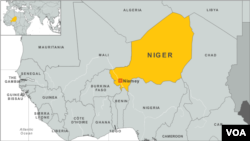Niger needs more international assistance to help it confront a looming food crisis compounded by an influx of refugees fleeing attacks by Boko Haram Islamist fighters in neighboring Nigeria, the country's prime minister said.
The twin crisis highlights the strain being put on Niger, a uranium producer straddling the Sahara that is one of the world's poorest nations, by recurrent poor harvests and the spillover from its neighbor's conflict with militants.
Niger's southwestern Diffa region, which borders Nigeria's violence-ravaged Borno State, has seen the arrival of more than 87,000 refugees since May of last year, Brigi Rafini said during a visit to the area on Wednesday. More than half are children.
The influx comes as a poor harvest in Diffa this year has left the majority of the region's estimated 500,000 inhabitants facing food shortages. Nearly a quarter of all children are now suffering from acute malnutrition.
“The combination of these two shocks has put the displaced people and the local population in an extremely vulnerable situation, creating all the conditions for a food crisis,” Rafini said in a statement.
Children need schooling
More than 25,000 refugee children also need schooling, but displaced Nigerians are living in classrooms in a number of locations, causing the closure of 35 schools, he added.
Agencies including the World Food Program, the U.N. refugee agency and UNICEF are already working in Diffa. But Rafini said more needed to be done and he called upon the people of Niger to do their part to help.
Nigeria's Boko Haram militants have stepped up their attacks across much of the country's north in the past year, raiding villages, kidnapping children and seizing territory for their declared caliphate.
Their operations have increasingly spilled over Nigeria's borders into Niger to the north and Cameroon to the east.
Last month, more than 300 Nigerian soldiers fled to Diffa following clashes with Boko Haram in the border town of Malam Fatouri.
Regional authorities imposed an overnight curfew on vehicles in Diffa two weeks ago to prevent militant infiltrations after another attack on the Nigerian town of Damasak saw 10,000 refugees flee across the border.











